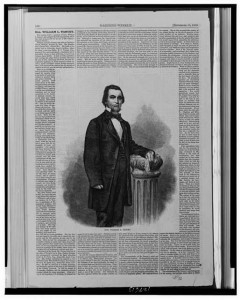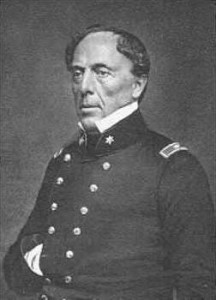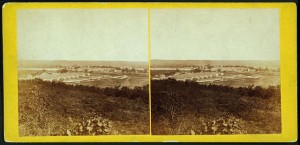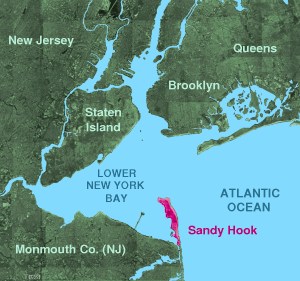Scurvy in the Army
In addition to urging the government to procure its own bandages and vaccinate its soldiers against small pox, the editors at The New-York Times on May 17, 1861 urged the U.S. Army to improve the diet of its troops:
The Health of the Army.
… The late notorious Secretary of War, FLOYD, put forth, in 1859, the following humane General Order No. 3:
“1. Purchases by the Subsistence Department of ‘pickles,’ ‘sour kraut,’ ‘dried fruit,’ and ‘fresh vegetables,’ unless for the sick in hospital, are prohibited for the future.
2. Two ‘issues’ per week of ‘desiccated vegetables,’ may be made in lieu of ‘beans’ and ‘rice.’
3. When ‘fresh beef can be procured at 6 1/2 cents or less, per pound, net weight, it will be issued to the troops five times per week.”
“Of the disastrous effect of this General Order,” says the Medical Times, “we are furnished with an instance by a medical friend, who, in 1859, acted as medical officer to a large military command moving from Fort Leavenworth to Salt Lake. For 900 miles the troops were provided with no vegetable anti-scorbutic, except a few insipid desiccated vegetables. Scurvy began to show itself. Application was made for pickles to be issued to the men. The reply was, that the commissary had no pickles! ‘Buy them of the traders and sutlers,’ was the surgeon’s reply. The commissary answered, and as a military man, very properly, ‘Doctor, General Order No 3 forbids me to purchase them.’ The man were thus deprived of proper food, and scurvy was no, slow in manifesting itself. During the term of years, the statistics of which we have just quoted, the cost of maintaining our army amounted to fully seventy-five millions of dollars. Compared to the various rates paid for the transportation of everything in the remote wilds of the West, the economy evinced by General Order No. 3, of Match 4, 1859, was pitiful, scandalous, shameful, and inhuman, and stems as if intended for effect. We leave it to political journals to discuss ‘flour contracts,’ &c., but in the name of humanity we protest, as medical men, against such orders as that we copy.”
How this regulation has worked, on a wider scale, may be seen from the Medical Statistics of the United States Army, just published. We are told there (page; 324) that, in five years, ending Dec. 31, 1859, out of an army of about 14,000 men, scattered over the country, there were two thousand eight hundred and three cases of scurvy!
We are credibly informed that, the Massachusetts Regiment, encamped in the Capitol at Washington, had, for the first ten days, not a single vegetable, and fresh meat but once! Such fare as this is a disgrace to our Commissariat. It may be necessary not to enjoin vegetables as a necessary ration, on account of the difficulty of transport, but certainly they should be allowed whenever they can be easily procured. Nothing has saved our men in Washington from scurvy but their own purchases of fruit.
This ought not to be. Men who have abandoned business and homes for the sake of defending the Government, should at least be fed as well as day-laborers.
Our mechanics and farmers are accustomed to good, nourishing fare. They do not, of course, ask for luxuries. They are willing to make sacrifices. But salt pork and hard bread, continued day after day, even with the occasional variety of a ham or a loaf of new bread, is not the kind of food to fight well on. We are aware that the Government has been caught, somewhat unprepared, by the rapidity with which the regiments have moved on Washington. It is not the present managers of the commissariat we would criticize, so much as the prescribed rations. Let the War bill include fresh vegetables as a ration, wherever they can be easily procured.

William L. Yancey's fire-eating a result of bad southern cooking? (Harper's 09-15-1860 LOC - LC-USZ62-127613)
Another great evil, which perhaps can be cured by new Army regulations, is the bad cookery. A military surgeon of the service has tersely said that, “Beans kill more than bullets.” We lay it down as a primary law, that no American by instinct knows anything about cooking; least of all an American man. It would be true of the whole country, that “bread kills more than bullets;” and, if this dreadful rebellion is ever traced by some future Buckle to a material cause, it will, very probably, be to the horrible Southern cooking, which had soured the temper, and disordered the brain of the men of the Slave States with a morose dyspepsia. The present cooking of the Army, whether of beans, bread or meat, is enough to turn them all traitors, or to do the work of the enemy at once without shot or blow.
Now, in the new regulations, as has been suggested by the medical authorities here, why not have in each company a professional employed cook, or pay one of the soldiers, who has truly learned the business for this extra labor, so that the constitutions of our soldiers might not be utterly impaired before they were fairly in battle. We believe this arrangement would save more lives and impart more vigor to our men than any other means of so simple a kind.
Good digestive and well-cooked food are even more necessary for a warrior than a man of peace? Half of the fearful diarrhoeas, dysenteries, choleras, and the like diseases, which are the worst enemies of the soldier, are either caused or stimulated by bad cookery If we had the French genius for cookery, we might trust to the common soldiers doing their own cooking; but we have not, and so must have recourse to education and a thorough training. Let, us have, then, professional army-cooks, who can also shoulder a musket when the emergency comes.
____________________________
Was It the Cooking?
SANDY HOOK, Thursday, May 16.
Three men from Company B of the New-York Zouaves, deserted from here last night, taking the news-boat belonging to the Associated Press with them. The oars of the boat were hid under the boat-house, where it was thought it would be impossible to find them, but, notwithstanding, the deserters managed to discover them.
Sandy Hook picture is licensed by Creative Commons



